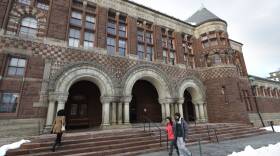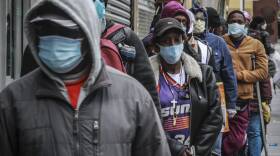EXPLORE MORE
Monday on BPR:
UMass President Marty Meehan
Chris Dempsey & Bill Straus for our monthly transportation panel
Bowling Alone author Robert Putnam
Folks from Roxbury’s Suya Joint – whose manager was just released from ICE custody
Recent segments
-
In Wake Of Dual Shootings, Warren Calls For Immediate Vote On Assault Weapons Ban
"We have the capacity to force a vote, and I think it’s time we do that," the Massachusetts senator said. -
Baker Stands By State Vaccine Plan, Citing Strong Performance As Measured By Statistics
The governor acknowledged criticism from lawmakers but insisted the current mix of state and local efforts is most effective. -
All Rev'd Up: Harvard Should Be Leading On Reparations But Lags Behind
Students and advocates are calling on Harvard University to acknowledge its role in slavery and offer reparations. -
AG Healey: It Is Time To Stop 'Making Excuses' For Hate-Fueled Violence And Prosecute Hate Crimes
Healey tells Boston Public Radio she supports legislation to update the state's existing hate crime laws. -
Black Lives Have Been Lost Unnecessarily To COVID-19 Because Of America's Failure To Reckon With Systemic Racism, Former Harvard Researcher Says
If reparations to slavery were enacted before the pandemic, COVID-19 transmission and deaths could have been mitigated dramatically, according to Dr. Michelle Morse. -
'Significant' Threat If State Police Decline COVID-19 Vaccines, Says Former Suffolk County Sheriff
Andrea Cabral speaks about concerns regarding the 845 unvaccinated members of the State Police.
Listen to previous shows
-

BPR Full Show 12/9/20: The Next-Best Medicine
M.I.T. economist Jonathan Gruber discussed his forthcoming editorial on how the U.S. government might want to use a lottery system to incentivize tracking for Americans who get vaccinated from COVID-19, as a way to gain insight on vaccine effectiveness. We turned to listeners to talk about “pandemic stomach,” amid a spike in Americans buying antacids. Brenda Cassellius, Superintendent of Boston Public Schools, called in to talk about the decision making process behind the reopening of 28 public schools in Boston, and evolving attitudes around whether schooling ought to remain open during the pandemic. She also responded to a range of questions and comments from listeners who phoned in. Medical ethicist Art Caplan discussed news on COVID-19 vaccines, from reports of allergic reactions to the Pfizer vaccine in the U.K., updates on a newly-announced treatment out of China, and the expected timeline for FDA approval of vaccines here in the U.S. Tech writer Andy Ihnatko discussed the latest headlines from the world of tech, including Washington Post reporting on a forthcoming antitrust lawsuit against Facebook, news that Samsung will no longer include chargers with their phones, and NordPass' list of the most-used passwords of 2020. We closed out Wednesday’s show by returning to listeners, to talk about finding ways to laugh through the coronavirus pandemic. -

Logistics Get 'Harder' For COVID-19 Vaccine, Says Art Caplan
The United Kingdom delivered the first shot in its COVID-19 vaccination program on Tuesday, becoming the first Western country to deliver a broadly tested vaccine to the general public. Two people who received the Pfizer and BioNTech shot developed allergic reactions, but recovered. Medical ethicist Art Caplan spoke with Boston Public Radio on Wednesday about what this latest development means for the vaccine’s rollout. “You’re probably going to have to wait after you get the vaccine - like an hour in the place where you get it - to make sure you don’t have that kind of reaction,” he said. “So that makes it harder, logistically, because now you’ll have people lined up, trying to find a place to sit them, and once you unfreeze the Pfizer vaccine, you have to administer it all like 500 at a time.” Caplan also worries that anti-vaxxers will use this as fuel against the vaccine. “You’re probably going to see anti-vax people use that to scare people away from the vaccine,” he said. “That would be unfortunate.” Art Caplan is the Drs. William F and Virginia Connolly Mitty Chair, and director of the Division of Medical Ethics at the NYU Grossman School of Medicine. -

BPR Full Show 12/8/20: Light & Moist
Today on Boston Public Radio: We kicked things off by opening lines, to talk with listeners about the surging coronavirus cases in Mass., and whether the state ought to be imposing stricter lockdown measures to quell the spread of COVID-19. NBC Sports Boston reporter and anchor Trenni Kusnierek discussed new charges in the prostitution cases involving Patriots owner Robert Kraft, who himself will not face charges. She also weighed in on the $1 million PPP loan for former Patriot Tom Brady, and Sport Illustrated's list of five athlete activists it named “Sportspersons of the Year." Jamahrl Crawford talked about his impressions of the Mass. police reform bill, the political limits of the “defund the police” slogan, and the value in hiring police officers from within the communities they'd be serving. Crawford is a Boston based Boston community activist, and the publisher of the Blackstonian. He also served on the Boston Police Reform Task. Food writer Corby Kummer talked about Singapore becoming the first nation to approve lab grown meat for human consumption, and growing displeasure in the U.S. with foods that’re described as “moist." He also spoke about the pandemic’s impact on the already-miserable food served in prisons, and other food headlines. Next, we opened lines to talk with listeners about lab-grown meat, and whether you'd be open to making the switch from the real thing. CNN’s John King returned for his weekly breakdown of national political stories, including infighting in Washington over further pandemic relief, and conversation around whether or not to pursue potential legal charges against President Trump and his allies once President-elect Biden is in office. -

Corby Kummer: Lab-Grown Meat Approved In Singapore
Singapore has become the first nation on the planet to approve cell-cultured meat for human consumption. Food writer Corby Kummer spoke to Boston Public Radio on Tuesday about San Francisco start-up Eat Just Inc., which got regulatory approval to cell it’s lab-grown chicken in Singapore. “We talk all the time about Beyond Meat and the Impossible Burger, but this is different,” Kummer said. “Its cells are from animals, that are then cultured in quantity enough to, in this case, make a chicken cutlet.” What’s good about this is that only one animal is needed to give cells which will then be cultured to produce boundless chicken meat, Kummer said. “Only one chicken has to die to provide vibrant cultures, which the company then builds out onto various forms,” he said. “Cell-cultured meat has had billions of dollars invested in it over the past years, and it will be coming here [to the United States.]” Kummer is a senior editor at The Atlantic, an award-winning food writer, and a senior lecturer at the Tufts Friedman School of Nutrition and Policy. -

BPR Full Show 12/7/20: Making the Grade
Today on Boston Public Radio: Dr. Elizabeth Pinsky, a pediatrician and psychiatrist at MGH, talked about the mental and physical strain that remote learning has taken on the thousands of Mass. kids stuck at home through the pandemic, and offered her assessment of the state's pandemic response with respect to public education. We opened our lines to talk with listeners about Dr. Pinksy's comments about schooling in Mass., and ask: did we get it wrong? Charlie Sennott, GBH News analyst and GroundTruth Project CEO, talked about the potential problems with the U.K.’s fast-tracked approval of Pfizer's coronavirus vaccine. He also reflected on President-elect Joe Biden’s choices for secretary of state and director of national intelligence director, and weighed in on the future of “Trumpism” after President Trump leaves office. TV expert Bob Thompson discussed news that Warner Brothers plans to release all of their 2021 films online at the same time they’ll be in theaters. He also reviewed Netflix’s “Mank,” Showtime’s “Your Honor,” and HBO's new documentary about The Bee Gees, “How Can You Mend a Broken Heart." Irene Monroe and Emmett Price, hosts of GBH’s All Rev’d Up podcast, discussed last week’s Supreme Court ruling on COVID restrictions and religious liberty, reflecting on the impact of the court’s decision to side with religious organizations. Boston Globe business columnist Shirley Leung explained the growing tension between Mass. Gov. Charlie Baker and local leaders and public health officials around the spike in Mass. residents who’re testing positive for COVID-19. Anthony Rudel, general manager for music at GBH, talked about GBH’s upcoming collaboration with performance arts organization The Handel & Haydn Society, for their annual holiday production of “Messiah.”









